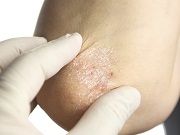Topical Treatments Show Some Benefit for Plaque Psoriasis Patients
As research continues to be done to find the most efficient treatment for patients with plaque psoriasis a study was recently published looking at how the inclusion of topical corticosteroids can benefit the care provided.

As research continues to be done to find the most efficient treatment for patients with plaque psoriasis a study was recently published looking at how the inclusion of topical corticosteroids can benefit the care provided.
The study results, published in Journal of the European Academy of Dermatology and Venereology specifically focused on the adding of the corticosteroids when etanercept was reduced from the initial dose of 50mg twice weekly to the “maintenance dose,” of 50mg once weekly. The 300 patients selected to participate had stable moderate-to-severe plaque psoriasis for more than six months and psoriasis-affected body surface area (BSA) of greater than 10 percent as well as a Psoriasis Area and Severity Index (PASI) score of more than 10.
Patients participating in the phase 3b, multicenter, randomized, open label study were divided into groups after starting with 12 weeks of taking 50 mg of etanercept twice a week. They were then split with some taking the medication twice a week or once a week with the goal being to achieve “static physician global assessment (sPGA) status of clear for 12 weeks.”
Results of the study showed that with the addition of the topical treatment when taking the medication once a week was similar to the group that had not added the topical prescription and was staying with the twice a week dose of the other. The average difference (95% confidence interval) between etanercept arm (n=140) and entanercept plus topical arm in change in PASI score from week 12 to week 24 was 16.2% (-3.5%, 35.8%)
The authors reported the response rate for the two groups proved similar as well with 40.6 and 45.8% reaching the clear or almost clear status for patients in etanercept and etanercept plus topical arms at week 12. At week 24 those numbers changed to 53.5 and 45.4% at week 24.
Several authors reported connections to the pharmaceutical industry including Amgen Inc. and Wyeth which was acquired by Pfizer. The two companies provided funding for the study.